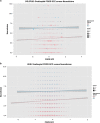Dissection of major depressive disorder using polygenic risk scores for schizophrenia in two independent cohorts
- PMID: 27801894
- PMCID: PMC5314119
- DOI: 10.1038/tp.2016.207
Dissection of major depressive disorder using polygenic risk scores for schizophrenia in two independent cohorts
Abstract
Major depressive disorder (MDD) is known for its substantial clinical and suspected causal heterogeneity. It is characterized by low mood, psychomotor slowing and increased levels of the personality trait neuroticism; factors also associated with schizophrenia (SCZ). It is possible that some cases of MDD may have a substantial genetic loading for SCZ. The presence of SCZ-like MDD subgroups would be indicated by an interaction between MDD status and polygenic risk of SCZ on cognitive, personality and mood measures. Here, we hypothesized that higher SCZ polygenic risk would define larger MDD case-control differences in cognitive ability, and smaller differences in distress and neuroticism. Polygenic risk scores (PRSs) for SCZ and their association with cognitive variables, neuroticism, mood and psychological distress were estimated in a large population-based cohort (Generation Scotland: Scottish Family Health Study, GS:SFHS). The individuals were divided into those with, and without, depression (n=2587 and n=16 764, respectively) to test for the interactions between MDD status and schizophrenia risk. Replication was sought in UK Biobank (UKB; n=6049 and n=27 476 cases and controls, respectively). In both the cohorts, we found significant interactions between SCZ-PRS and MDD status for measures of psychological distress (βGS=-0.04, PGS=0.014 and βUKB=-0.09, PUKB⩽0.001 for GS:SFHS and UKB, respectively) and neuroticism (βGS=-0.04, PGS=0.002 and βUKB=-0.06, PUKB=0.023). In both the cohorts, there was a reduction of case-control differences on a background of higher genetic risk of SCZ. These findings suggest that depression on a background of high genetic risk for SCZ may show attenuated associations with distress and neuroticism. This may represent a causally distinct form of MDD more closely related to SCZ.
Conflict of interest statement
AMM has previously received grant support from Pfizer, Lilly and Janssen. These studies are not connected to the current investigation. SML has previously received research grant support from Pfizer, Roche, Abbvie and Sunovion, as well as personal fees from Roche, Sunovion and Janssen, outside the present work. The remaining authors declare no conflict of interest.
Figures


Similar articles
-
Stratifying major depressive disorder by polygenic risk for schizophrenia in relation to structural brain measures.Psychol Med. 2020 Jul;50(10):1653-1662. doi: 10.1017/S003329171900165X. Epub 2019 Jul 18. Psychol Med. 2020. PMID: 31317844
-
Higher polygenic risk scores for schizophrenia may be suggestive of treatment non-response in major depressive disorder.Prog Neuropsychopharmacol Biol Psychiatry. 2021 Jun 8;108:110170. doi: 10.1016/j.pnpbp.2020.110170. Epub 2020 Nov 10. Prog Neuropsychopharmacol Biol Psychiatry. 2021. PMID: 33181205
-
Major depressive disorder and current psychological distress moderate the effect of polygenic risk for obesity on body mass index.Transl Psychiatry. 2015 Jun 30;5(6):e592. doi: 10.1038/tp.2015.83. Transl Psychiatry. 2015. PMID: 26125155 Free PMC article.
-
Co-shared genetics and possible risk gene pathway partially explain the comorbidity of schizophrenia, major depressive disorder, type 2 diabetes, and metabolic syndrome.Am J Med Genet B Neuropsychiatr Genet. 2019 Apr;180(3):186-203. doi: 10.1002/ajmg.b.32712. Epub 2019 Feb 6. Am J Med Genet B Neuropsychiatr Genet. 2019. PMID: 30729689 Free PMC article. Review.
-
A systematic review of genome-wide research on psychotic experiences and negative symptom traits: new revelations and implications for psychiatry.Hum Mol Genet. 2018 Aug 1;27(R2):R136-R152. doi: 10.1093/hmg/ddy157. Hum Mol Genet. 2018. PMID: 29741616 Free PMC article.
Cited by
-
Polygenic risk for neuroticism is associated with less efficient control in more difficult situations.Psychiatry Res Neuroimaging. 2023 Oct;335:111716. doi: 10.1016/j.pscychresns.2023.111716. Epub 2023 Sep 14. Psychiatry Res Neuroimaging. 2023. PMID: 37717543 Free PMC article.
-
Genetics Factors in Major Depression Disease.Front Psychiatry. 2018 Jul 23;9:334. doi: 10.3389/fpsyt.2018.00334. eCollection 2018. Front Psychiatry. 2018. PMID: 30083112 Free PMC article. Review.
-
Association of Whole-Genome and NETRIN1 Signaling Pathway-Derived Polygenic Risk Scores for Major Depressive Disorder and White Matter Microstructure in the UK Biobank.Biol Psychiatry Cogn Neurosci Neuroimaging. 2019 Jan;4(1):91-100. doi: 10.1016/j.bpsc.2018.07.006. Epub 2018 Jul 31. Biol Psychiatry Cogn Neurosci Neuroimaging. 2019. PMID: 30197049 Free PMC article.
-
Identification of schizophrenia symptom-related gene modules by postmortem brain transcriptome analysis.Transl Psychiatry. 2023 May 4;13(1):144. doi: 10.1038/s41398-023-02449-8. Transl Psychiatry. 2023. PMID: 37142572 Free PMC article.
-
Associations between schizophrenia genetic risk, anxiety disorders and manic/hypomanic episode in a longitudinal population cohort study.Br J Psychiatry. 2019 Feb;214(2):96-102. doi: 10.1192/bjp.2018.227. Epub 2018 Nov 26. Br J Psychiatry. 2019. PMID: 30472973 Free PMC article.
References
-
- Kessler RC, Berglund P, Demler O, Jin R, Koretz D, Merikangas KR et al. The epidemiology of major depressive disorder: results from the National Comorbidity Survey Replication (NCS-R). JAMA 2003; 289: 3095–3105. - PubMed
-
- Austin MP, Mitchell P, Goodwin GM. Cognitive deficits in depression: possible implications for functional neuropathology. Br J Psychiatry 2001; 178: 200–206. - PubMed
-
- Navrady LB, Ritchie SJ, Chan SWY, Kerr DM, Adams MJ, Hawkins E et al. Intelligence and neuroticism in relation to depression and psychological distress: evidence of interaction using data from Generation Scotland: Scottish Family Health Study and UK Biobank. bioRxiv 2016; http://biorxiv.org/content/early/2016/02/12/039545. - PubMed
Publication types
MeSH terms
Grants and funding
LinkOut - more resources
Full Text Sources
Other Literature Sources
Medical

